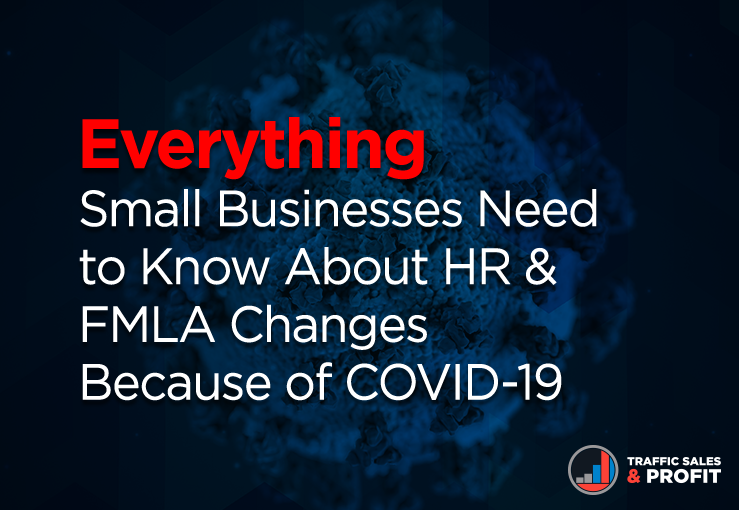Lamar sat down with Delmar Johnson – HR Consultant & Founder of HR Brain for Hire to ask the questions that every small business owners need to keep top of mind during the COVID-19 era. These essential tips will help you navigate the muddy waters of emergency paid sick leave, the Emergency FMLA, and work from home policies.
- 1. The Major Questions
- 2. On the Family First Coronavirus Response Act
- 3. On Emergency Paid Sick Leave
- 4. On Remote Work Policies
- 5. Making It Through This
The Major Questions
When the coronavirus fallout hit the US, it hit hard and a lot more quickly than most people anticipated. Stores and shops were closed within days and have remained so for nearly a month since national social distancing protocols have been put in place. The majority of small business owners and entrepreneurs have been scrambling to keep up with what these closures and federal policies mean for the Human Resources arm of their businesses.
Some common questions are:
- How do I work with remote workers?
- Do I have to send them home?
- Do I have to pay them while they’re at home?
- How long will I have to keep them at home?
For now, there isn’t a one size fits all answer to these important questions. Every business needs to operate on a case by case basis. Delmar tells us that there has been an influx of so much information since the announcement of the Emergency Family & Marriage Leave Act, and a lot of it is ambiguous even to HR professionals.
But thank’s to her 26 years of expertise, Delmar was able to break down all the most important things for you to consider when it comes to emergency paid sick leave, the emergency family and marriage act, and work from home policies to keep your business and employees safe.
On the Family First Coronavirus Response Act
In response to the outbreak of the coronavirus, the federal government has passed the Family First Coronavirus Response Act. Unlike the traditional FMLA, which usually requires a business to have at least 50 employees before they qualify, this emergency protocol has ambiguous language as to how many employees businesses do or do not require. That being said, the policies were drafted in direct response to the effects of COVID-19 so it is safe to assume that anyone affected will benefit from the statues within.
For more specific information, check out the official policies at: https://www.dol.gov/agencies/whd/pandemic/ffcra-employee-paid-leave
On Emergency Paid Sick Leave
Contrary to what was generally believed at first, you don’t have to pay employees emergency sick leave indefinitely if they contract COVID-19 or are required to care for a family member that has. There are clear qualifications and parameters around the granting and payout of emergency sick leave. In summary:
Employees to qualify for emergency leave if:
- If they are subject to quarantine because they have contracted COVID-19
- If they are diagnosed with COVID-19 and have documentation from a health professional
- If they are showing symptoms and actively seeking testing from a health professional
- Caring for child or dependant that has been diagnosed with COVID-19
In any other case, you are not required to grant emergency sick leave and employees must utilize whatever other leave or sick policy you have in place in your business. If they do qualify, there are a few things that you should be aware of regarding the payout for emergency sick leave:
You, as a business owner, are obligated to:
- Pay employees up to 80 hours, with a maximum payout of $511/day if they have contracted COVID-19 and have docmuentation from a health professional
- Pay employees up to 80 hours with a maximum payout of $200/day if they are the primary caregiver of a child or dependant has contracted COVID-19
IMPORTANT NOTE: For small business owners, the money you may have to pay out for emergency sick leave is 100% reimbursable based on the outlined policy in the Emergency Family and Marriage Leave Act. This includes health insurance costs, no payroll tax liability and even self-employed peoples will receive an equal credit in the event that leave must be taken.
On Remote Work Policies (Working From Home)
The government, along with nearly all authoritative HR entities have suggested that if employees can work from home, they should. Your business still needs to operate during these times if you hope to stay afloat so exploring your remote work policy is of the essence right now.
Even if you haven’t needed them in the past, you need to be developing your work from home policies even though it’s not a typical business requirement. Taking the time to be still, as Delmar says, and figure out what is going to work best for your business is key to ensuring that you and your employees come out on top of these uncertain times.
If you are not used to remote workers, or simply have never taken the time to consider a policy, here are a few things to consider to help you get started:
- Define how you are going to communicate with your remote workers,
- How often are you going to meet with them or require check-in?
- What are your expectations (do they differ from in-office procedures?)?
- Will they have to submit assignments or tasks through your chosen platform (i.e Trello or Teamwork)
- Are they allowed to work outside the home?
Have something in writing as a guideline at the very least, even if it shifts and changes after this immediate situation with COVID-19 is over, that way if anything occurs in the future where you need to rely on remote work, you’ll have something to fall back on.
If you are unable to enact a work from home policy…
Like in the case of physical locations or industries that cannot satisfy minimum business operation remotely, then you may consider a temporary lay off with the intention to bring employees back on when the situation improves. Doing this will allow employees to apply for unemployment benefits, which are being expedited now that unemployment rates are rising due to COVID-19 related job loss.
<div id=”makingit” class=”anchor”></div>
Making It Through This
You still have to run your business around the restrictions we are facing right now if you want to remain standing when it’s all said and done. Though this can be a lot to handle all at once don’t get so overwhelmed and stop yourself from reaching out if you truly need help with these policies and procedures. Now is the time, if any, to reach out to an HR consultant like Delmar with any specific questions tailored to your specific business needs.
If your business isn’t quite there yet or you want to take a more DIY approach, stay tuned in to the TSP group for more information on what you need to know for HR & FMLA concerns as they come from professionals like Delmar’s coveted #nuggets of knowledge.
You can get in contact with Delmar at www.delmarjohnson.com.
Keep in touch with TSP by following and subscribing to our social media pages! Connect with us on Facebook, Instagram, and YouTube for countless tips, additional tools, and most importantly a supporting community.
TSP Facebook Group: https://bit.ly/35ybwKs
TSP Instagram: https://bit.ly/3diGclx
TSP YouTube Channel: https://bit.ly/2L6pzxg















0 Comments